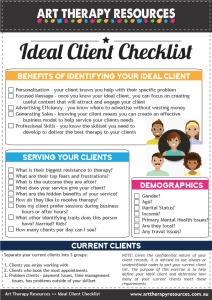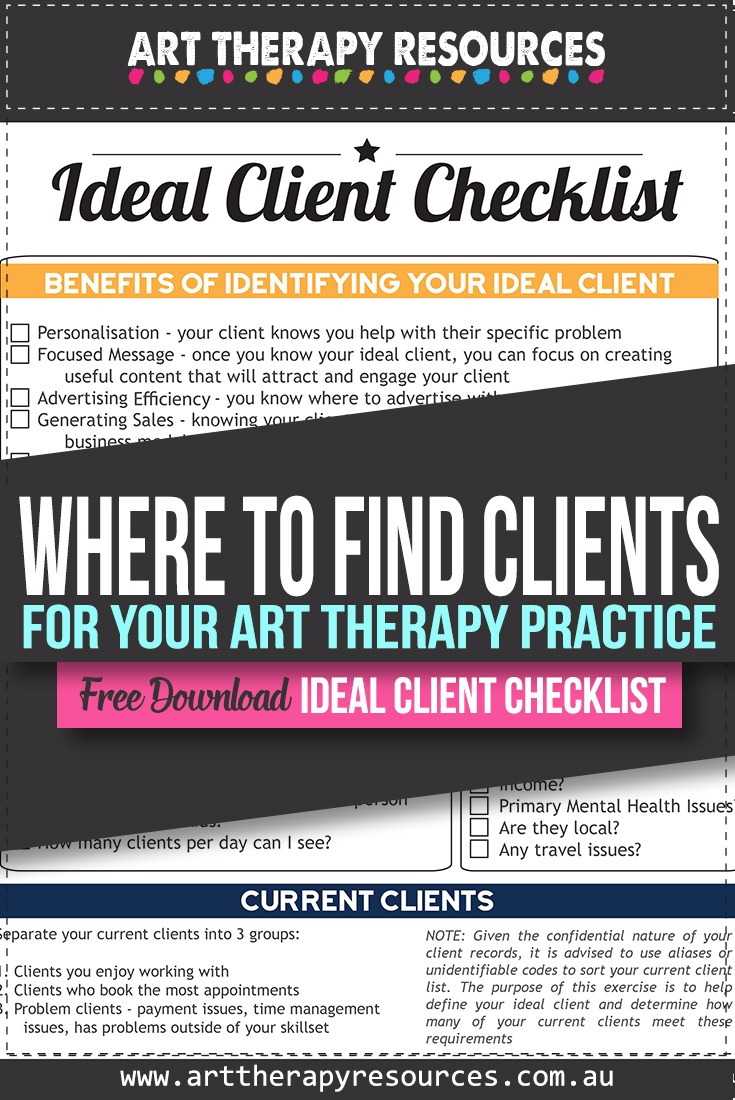THIS POST INCLUDES:
1. Create a strategy to find clients
2. Where to find therapy clients
3. Marketing to potential clients
4. Additional support reading
5. FREE DOWNLOAD Ideal Client Checklist
CREATE A STRATEGY TO FIND CLIENTS
As a new art therapist, you will need to spend a significant amount of time building your client list. Even as a long term private practice therapist, you may experience quiet times in your practice client work.
For any therapist who runs their own private practice, you will need to find new clients to ensure the ongoing viability of your art therapy practice.
Finding new clients can be stressful as you will need to undertake some marketing techniques and use a business mindset. This may be uncomfortable for some therapists as it requires a sales orientated mindset to effectively market your business to the public.
It’s a good idea to develop an overall strategy that will help you undertake the marketing techniques that you need to.
Marketing to potential clients is an important part of establishing a client list, however, you need to know where your clients are so that you can create a strategy on targeting your potential clients.
Your therapist marketing strategy should include:
- Understanding who your ideal client is
- Identifying where your ideal client can be found
- Developing an ethical marketing message about your practice
- Establishing an allied health professional network
- Establishing a medical professional network
- Establishing a therapy professional network
- Establish a professional directories network
- Establish communication channels to the public – eg. Newsletter, social media, website
- Develop an advertising suite of images, sales copy, and marketing materials
Each of the items above is listed as one step, however, each step has the potential to reach a larger network. If you are able to implement the above steps in your marketing strategy, you will have a comprehensive
WHERE TO FIND THERAPY CLIENTS
Some of the common avenues where art therapists can work include:
● Private practice
● Psychiatric facilities
● Hospitals – inpatients and outpatients
● Rehabilitation facilities – eg. head injuries and stroke victims
● Juvenile facilities
● Disability services – including learning, physical and mental impairment, autism and speech difficulties
● Palliative care
● Victim support – eg. victims of crime, family violence, natural disasters
● Addiction facilities
● Education – schools, colleges, universities, private education
● Mental health facilities
● Community support centres
These represent the more traditional avenues of working with clients. Working with these avenues can provide a solid approach to developing your art therapy practice. In addition to the above, you can use the reach of the internet and market your therapy practice in less conventional places online. This is especially relevant when using social media and online groups.
MARKETING TO POTENTIAL CLIENTS
Once you have found where your potential clients are in terms of marketing, you can begin to create marketing materials to use for publication in those areas. Your advertising should be created based on whether you are communicating directly to the client or referral groups.
MARKETING DIRECTLY TO CLIENTS
This marketing is created to communicate directly to your potential clients.
- Offline advertising – community groups, flyers in public places, TV, radio.
- Online advertising – includes Google Ads, social media advertising, online directories.
The marketing materials that you create for this group should include how you can help clients. Your marketing materials should detail the common problems that your ideal client experiences so that your potential client can identify themselves in your message.
MARKETING DIRECTLY TO REFERRAL NETWORKS
This marketing is created to communicate to those in professions who can refer their clients on to you for art therapy.
- Allied Health groups
- Schools and educational facilities
- Medical groups – private practice GP’s
- Professional networks
- Government departments – health, prison, disability, education, mental health, hospitals
- Other therapists
The marketing materials that you create for this group should include how you can help clients and how to make referrals to your practice. Your marketing materials should be focused on your qualifications and should detail the demographics of your ideal client so that other professionals immediately think of you when they treat your possible ideal client.
ADDITIONAL SUPPORT READING
We’ve included some useful blog posts that will help in the following ways:
- Developing a marketing strategy
- Developing a networking strategy
- Staying productive to build your therapy practice
- Engaging in self-care as a private practice owner
MARKETING
- How to Build an Email List for your Therapy Practice
- How to Create a Free Offer to Build Your Email List
- How to Create an Annual Social Media Plan in 60 mins
- How to Get Started With Google Analytics in 5 Easy Steps
- How to Plan Your Marketing Strategies
- Online Marketing Courses to Improve Your Marketing Skills
- The Best Marketing Methods for Art Therapists
- Understand the Marketing Cycle of Your Art Therapy Practice
NETWORKING
- 10 Art Therapy Associations and Organisations
- How to Establish Your Business Network
- Professional Networking for An Art Therapist
PRODUCTIVITY
- 10 Tools to Help Boost Your Productivity
- 10 Useful Planning Tools for Your Business
- 10 Blogging Tools to Boost Your Content Writing Productivity
- Podcasts about Productivity and Getting Things Done (GTD)
- Planning Template for Your Art Therapy Practice
- Task Management Software For Art Therapy Planning
SELF-CARE
FREE DOWNLOAD: Ideal Client Checklist
SIGN UP below to download the FREE Ideal Client Checklist to help identify the client you would like to work with in your therapy practice.
Download the FREE Ideal Client Checklist.

BUILD YOUR ART THERAPY REFERENCE MATERIALS:
Pin this image to your Pinterest board.

SHARE KNOWLEDGE & PASS IT ON:
If you’ve enjoyed this post, please share it on Facebook, Twitter, Pinterest. Thank you!
